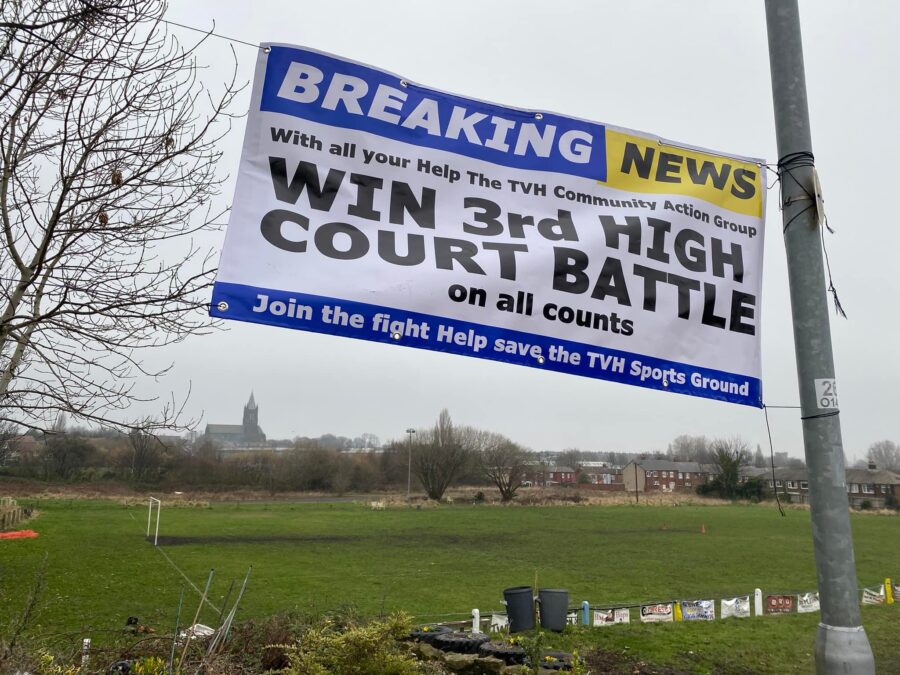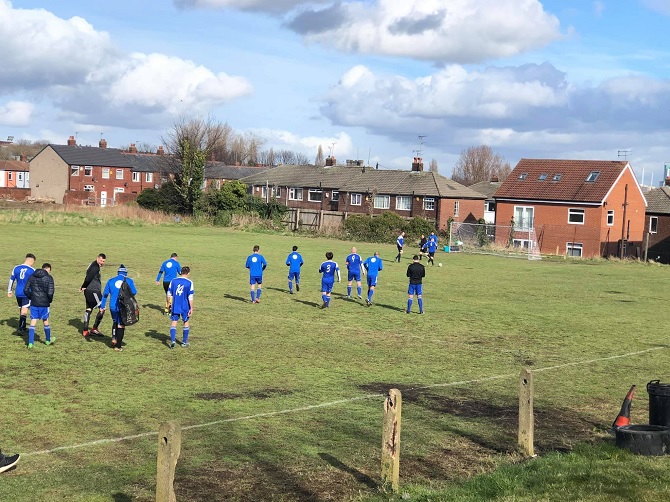Campaigners fighting to stop housing being built on the TV Harrison Sports Ground are celebrating after a High Court judge in London ruled Leeds Council’s refusal to list the field as an ‘asset of community value’ was unlawful.
The judgment quashes the council’s December 2020 decision not to include the land in its list of assets of community value (ACVs) and ordered the local authority to pay the campaign’s legal costs of £23,000.
TV Harrison Sports Ground has been restored by the local community in recent years and is used for recreational activities, informal football matches, fundraising events and other community sports and social activities – despite outline plans for up to 60 council houses on the site.

Michael Meadowcroft, chair of the campaign group, welcomed the judge’s decision. He said:
“This is a very significant decision in the High Court. It means that the City Council has to reconsider its decision not to designate the historic Ground as an Asset of Community Value.
“If it is designated it confers a number of vitally important rights, in particular the community would have the right to buy the ground in order to safeguard it.
“Also, in its submission to the court, the City Council stated that it ‘may terminate the Agreement [to purchase] in certain circumstances including if the land is listed as an Asset of Community Value’. These are very positive steps in our campaign to retain the sports ground and to begin to implement our plans to bring the whole site into use as a sports and community facility.
“Once the council has formally accepted the court’s decision we will look forward to working with local schools, sports clubs and community associations to bring the whole ground into full use as soon as possible.”
Supporters of TV Harrison CIC, a community interest company, had applied to add the sports ground to the Leeds City Council’s list of ACVs in April 2020. The council rejected that application, but this decision was ultimately quashed by the High Court in November 2020 with the consent of the council.
In December 2020 the application was refused again by Leeds City Council on the basis that it was not – in the council’s view – realistic to think that the community use of the site could continue.
The council said the land had been allocated for housing in its Site Allocations Plan and that it had “firm and settled plans” to develop the land for housing.
In the judgment handed down today, Mr Justice Lane held that in forming its opinion under the Localism Act in this way, the council had erred in law.
In particular, the judge found that the council:
- Failed to have regard to material considerations, in particular the opposing factors which might mean that the land could not in the end be developed for housing
- Took into account irrelevant considerations, by taking into account the factors which pointed towards the possibility of the site being redeveloped without at the same time taking into account the opposing factors
- Given the appearance of bias given the council’s own interest in redeveloping the site
- Failed to understand or give effect to section 88(1)(b) of the Localism Act.
The judgment sets a useful precedent for future ACV decisions. Mr Justice Lane set out the following helpful interpretation of section 88(1)(b):
“The legislation does not require there to be only one “realistic” future use of a building or other land.
“Several possibilities may each be realistic. The legislation does not require a potential future use to be more likely than not to come into being, in order for it to be realistic.
“The fact that the most likely of a number of scenarios is one which would not satisfy the statutory criteria (eg. a change of use from pub to residential) does not mean that any other potential future use is, without more, rendered unrealistic. It is only if the non-compliant scenario is so likely to occur as to render any compliant scenario unrealistic, that the non-compliant scenario will be determinative of the nomination.”
Ricardo Gama, solicitor at law firm Leigh Day, added:
“We are very pleased that the court has ordered Leeds City Council to look again at their decision not to list TV Harrison Sports Ground as an asset of community value (ACV).
“The judgment also provides important guidance on how the Localism Act could be interpreted in relation to future ACV decisions which I hope will help other community groups who are fighting to keep areas of local importance from being redeveloped. It is certainly a judgment which local authorities should pay close attention to.”
Council ‘accepts findings’
A Leeds City Council spokesperson said: “The council accepts the judicial review decision in relation to TV Harrison sports ground and will reflect on the findings of the judgement. As a result of the decision we are undertaking a review of our approach to determining Assets of Community Value in order to improve our processes.
“The council will now reconsider the application for TV Harrison sports ground to be registered as an Asset of Community Value.”
Last September, the court also quashed Leeds City Council’s decision to grant outline planning permission for a residential development on the Oldfield Lane site. The council was also ordered to pay campaigners’ costs of £6,500 plus VAT.
Council planners approved the outline proposals for a second time later that month.
The council argues that new social housing will help meet a chronic need for more housing and relieve waiting lists in the area.
Wortley’s Wembley
The pitch was disused for about 15 years after the facilities – which were once used by the prestigious Leeds City Boys teams and nicknamed ‘Wortley’s Wembley’ – fell into disrepair.
Members of the TV Harrison Community Action Group have, over the past two years, cut the grass and restored the once-overgrown pitch to allow community matches to take place. They argue the land was originally gifted to the children of Leeds in the form of a trust deed.
Follow WLD’s ongoing coverage of the TV Harrison issue here.

